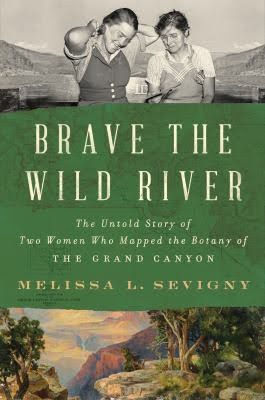Brave the Wild River: the Untold Story of Two Women Who Mapped the Botany of the Grand Canyon - 4.2 Stars
- Aug 13, 2025
- 3 min read
08/12/2025
“With nothing but stars and the river for company, she had time to wonder if coming here had been a mistake” p. 5
— author Melissa L. Sevigny (about botanist Lois Jotter) in Brave the Wild River: the Untold Story of Two Women Who Mapped the Botany of the Grand Canyon

Imagine deciding quite quickly to join a trip down the Colorado River. Knowing very little about one’s companions and the potential dangers involved in a boat trip that took 43 days, Elzada Clover and Lois Jotter, both trained botanists, embarked on that journey in 1938 with a male crew. Their goal was to survey and catalog the plant species of the Grand Canyon.
At that time, botany was a field for women, their way to enter science; collecting plants was women’s work. Readers were reminded repeatedly of the temerity and grit the women exhibited and marveled at how they preserved plant species for sending back to the University of Michigan. In addition to their work, they were crew members, cooks, and companions. The press underestimated their botanical work, presented incorrect information about the excursion, and often downplayed what was accomplished, yet Clover and Jotter persisted. They were ahead of their time in so many ways.
Readers appreciated the author’s writing style, her inclusion of quotes from the women’s journals, the reproduced photographs from the journey and their work, and the many descriptive passages about night, water, and campfires. The group also discussed the attention Clover gave to Native American rights and the conundrum faced by organizations like the National Park Service of trying to preserve natural spaces but also allow for enjoyment by the public. As Master Gardeners, we can learn from the women’s tenacity to continue pushing for awareness of nature, to inspire awe and wonder about the natural world, and to learn from history. Are we here today because we are the super successors of the women from times ago?Summary text - paragraphs provided
Reader Poll
Enjoyable - 4.4 out of 5 stars
Useful/Educational - 3.8 out of 5 stars
Recommended - 4.4 out of 5 stars
Reader Comments
“Even though it was historical nonfiction, the author did an absolutely beautiful job of painting the different scenes. The story centered on women in science -- specifically, science about plants. What's not to love about that?”
“The book was beautifully written and told the story of two exceptional women who made history.”
“Sevigny brings us the story of two little-known female botanists who broke ground in the field of botany and ecology, which may encourage readers to chart their own groundbreaking paths with plants.”
“The early exploration of the Colorado River along with the adventurous spirit of two tenacious women who wouldn’t take no as an answer.”
“Wonderful story of science, adventure, and poetic descriptions of nature.”
“Kimmerer reminds us of a softer, kinder world that we can access and promote at any time.”
“ A beautiful historic book written in descriptive language about two women scientists who accomplished so much ahead of their times. I felt they were sharing their knowledge and love of nature with me personally.”
“The women took such a chance on the expedition and worked tirelessly (or seemingly so) to do their own gathering and cataloging - and then care for the others.”
“I was inspired by the courage of two women botanists who challenged the prevailing attitudes toward female scientists and the contributions they made toward our understanding of the Grand Canyon.”
“I liked the book but was left with how the author had to fill in the gaps. Some of that seemed a bit contrived. Overall I enjoyed the context and premise of the book. Both Lois and Elzada deserve a place in history; this book helps codify that place.”
“I love the story about women scientists challenging the norms of the time and the persistence they needed for their research to be accepted...that we can read about today...so inspiring!”
“I really enjoyed seeing what Nature meant 100 years ago - so much has changed (gender equity) even as many things stay the same (conflicting goals conservation vs. tourism). The history of the book really brought the topic home and the writing style kept it engaging.”
“I appreciated the story of women leading the way in since and the challenges they faced. They are truly an inspiration to all women. I really enjoyed the writing and storytelling from the author as well.”

Next Book Club Discussion
Next Book Club Discussion - September 23, 2025
The selection for September 2025 is The Light Eaters: How the Unseen World of Plant
Intelligence Offers a New Understanding of Life on Earth by Zoë Schlanger.


